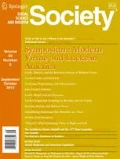Abstract
What was lost when sociology lost Freud? And why do some non-Freudians--who do not find themselves enamored with Freud’s theories--nonetheless find the loss of Freudian terms of art from the theoretical languages of the human sciences disturbing? Beginning with cues from Howard Kaye and Samuel Moyn, this short response to Dr. Kaye’s recently published book explores these questions.
Similar content being viewed by others
Notes
Samuel Moyn, “Freud’s Discontents: Why did one of the twentieth century’s most influential thinkers fade from significance,” The Nation, November 2, 2016.
For a sociological discussion of the “authority relationship,” see Heinrich Popitz, Phenomena of Power: Authority, Domination, and Violence, translated by Gianfranco Poggi (New York: Columbia University Press, 2017).
Kaye, Freud as a Social and Cultural Theorist, p. 178.
Near the conclusion to his book, professor Kaye notes that the 80 years since Freud’s death can be “divided roughly into 40 years of idealization, followed by 40 years of vilification,” and thus notes that perhaps we are only just now coming to understanding what was really at stake in the Freud wars, and indeed in Freud’s texts themselves.
Elaine Showalter, “On Hysterical Narrative,” Narrative 1 (1): 24–35, 1993, 33.
Showalter, “On Hysterical Narrative,” 29; the quotation is from Hélène Cixous, “The Laugh of the Medusa,” In The Critical Tradition: Classic Texts and Contemporary Trends, edited by David Richter, 1090–1102 (New York: St. Martin’s Press, 1989), 1098.
Showalter, “On Hysterical Narrative,” 27.
Showalter, “On Hysterical Narrative,” 32; the quotation is from Martha Noel Evans, Fits and Starts: A Geneaology of Hysteria in Modern France (Ithaca: Cornell University Press, 1991), 282.
Showalter, “On Hysterical Narrative,” 32.
Amy Allen, “‘Psychoanalysis and Ethnology’ Revisited: Foucault’s Historicization of History,” The Southern Journal of Philosophy volume 55, 2017: 31-46; Amy Allen, “Foucault, Psychoanalysis and Critique: Two Aspects of Problematization,” Angelaki: Journal of the Theoretical Humanities 23 (2), 2018: 170–186.
Hartmut Rosa, Social Acceleration: A New Theory of Modernity, translated by Jonathan Trejo-Mathys (New York: Columbia University Press, 2013).
Kaye, Freud as a Social and Cultural Theorist, 200–201.
Author information
Authors and Affiliations
Corresponding author
Additional information
Publisher’s Note
Springer Nature remains neutral with regard to jurisdictional claims in published maps and institutional affiliations.
This Review Symposium is based on Freud as a Cultural Theorist: On Human Nature and the Civilizing Process, by Howard L. Kaye (London and New York: Routledge, 2019).
Rights and permissions
About this article
Cite this article
Reed, I.A. Sigmund Freud and Social Theory Manqué. Soc 57, 281–286 (2020). https://doi.org/10.1007/s12115-020-00480-9
Published:
Issue Date:
DOI: https://doi.org/10.1007/s12115-020-00480-9



